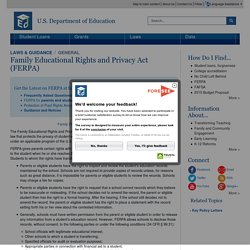

Professional Liability Insurance. Professional and Student Membership in the Association of American Educators includes $2,000,000 Professional Liability Insurance coverage—more protection than other teacher associations provide for a much lower price.

Not all policies are alike and the AAE policy has some extra protection that other organizations don't offer. The AAE policy offers $2,000,000 of protection per occurrence, per member. Defense costs are paid in addition to this amount. Click here for a comparison. Every active AAE professional or student member is insured individually—they receive a personal liability insurance policy written in their name. CLICK HERE to read or download a copy of a sample policy*visit ftj.com/aae to see the actual policy for your state Access to AAE's legal service benefits is never dependent on the discretion and pre-approval of an AAE executive. 0067. Youtube. Subpart 5 - Teacher Liability Protection. Family Educational Rights and Privacy Act (FERPA) Family Policy Compliance Office (FPCO) Home The Family Educational Rights and Privacy Act (FERPA) (20 U.S.C. § 1232g; 34 CFR Part 99) is a Federal law that protects the privacy of student education records.

The law applies to all schools that receive funds under an applicable program of the U.S. Department of Education. FERPA gives parents certain rights with respect to their children's education records. These rights transfer to the student when he or she reaches the age of 18 or attends a school beyond the high school level. Parents or eligible students have the right to inspect and review the student's education records maintained by the school. Schools may disclose, without consent, "directory" information such as a student's name, address, telephone number, date and place of birth, honors and awards, and dates of attendance. For additional information, you may call 1-800-USA-LEARN (1-800-872-5327) (voice). Or you may contact us at the following address: Values Assessment. Barrett Values Centre. Who you are, what you hold dear, what upsets you, and what underlies your decisions are all connected to your personal values.

Our values reflect what is important to us. They are a shorthand way of describing our individual motivations. Together with our beliefs, they are the causal factors that drive our decision-making. Understanding our values helps us to understand why we may act or react the way we do. Living your values can make you feel in balance. The personal values assessment is simple survey that takes just a few minutes of your time and provides a wealth of information and exercises in the report to help you understand your values. After taking your assessment, explore more about your values here. PSETH05.pdf. Intasc model core teaching standards 2011 4. Professional Ethics. Introduction Top The debate concerning the ethics of education that took place in the United States at the beginning of the 20th century has gained renewed, worldwide interest in the past two decades.

The contemporary debate targets two overlapping sides of the role morality plays in education: the moral behaviour of the teacher and the morality children learn in school. In 2001, Education International (EI), officially entered this debate when the Declaration on Professional Ethics (DPE) was adopted by EI’s 3rd World Congress held in Jomtien, Thailand. The document was further updated at its 4th World Congress in Porto Alegre, Brazil in 2004. The DPE is mainly intended as a blueprint for EI affiliates' own guidelines. Its objectives are: to raise consciousness about the norms and ethics of the teaching profession; to help increase job satisfaction in education; to enhance status and self-esteem, and; to increase respect for the profession in communities.
Policy Top Activities Top Studies: Code of Ethics for Registered Teachers. Code of Ethics for Educators. The professional educator strives to create a learning environment that nurtures to fulfillment the potential of all students.

The professional educator acts with conscientious effort to exemplify the highest ethical standards. The professional educator responsibly accepts that every child has a right to an uninterrupted education free from strikes or any other work stoppage tactics. PRINCIPLE I: Ethical Conduct toward Students The professional educator accepts personal responsibility for teaching students character qualities that will help them evaluate the consequences of and accept the responsibility for their actions and choices.
We strongly affirm parents as the primary moral educators of their children. Code of Ethics. Preamble.
